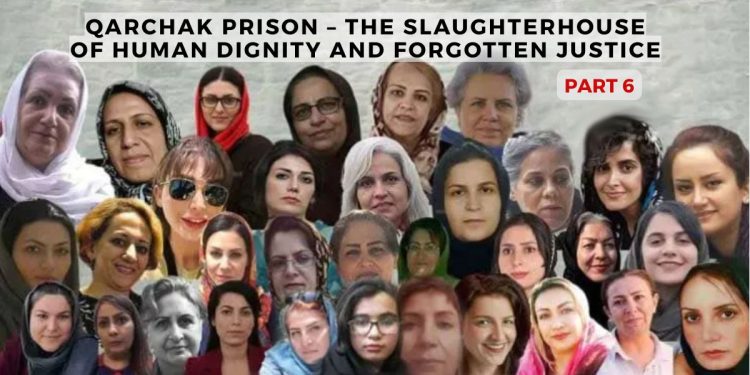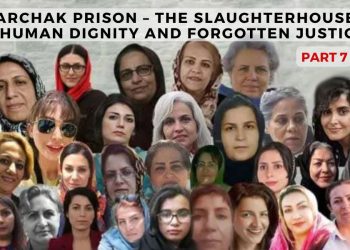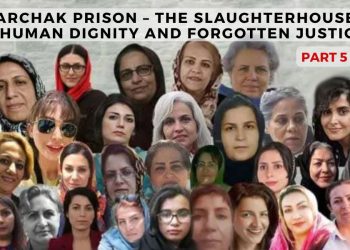Qarchak Prison in Varamin is not only a symbol of repression and torture; despite all inhumane conditions and relentless pressure, it has also become a center of women’s political resistance. Women who have endured years of torture, humiliation, and deprivation have themselves become living testaments of resilience and justice-seeking. Their resistance is reflected not only in hunger strikes and open letters but also in their daily lives within damp walls and an environment rife with insecurity and disease.
Maryam Akbari Monfared – Sixteen Years in Prison, Still Standing
Maryam Akbari Monfared is one of Iran’s most well-known political prisoners. She has been imprisoned since 2009 without a single day of furlough and is now in her sixteenth year of detention. Multiple illnesses, including thyroid dysfunction, rheumatoid arthritis, spinal disc disease, and liver problems, have severely weakened her body, yet she is denied specialized treatment.
The Akbari Monfared family has itself been a multi-generational victim of repression. Three brothers and one sister of Maryam were executed in the 1980s; Abdolreza and Roghieh Akbari Monfared were among the victims of the 1988 massacre. In recent years, her family members have faced pressure and arrests for pursuing justice and truth. In 2016, Maryam filed a complaint with the UN Working Group on Enforced Disappearances, which resulted in the recognition of her siblings as official victims of enforced disappearance. Today, despite illness and years of imprisonment, she remains a living symbol of resistance and justice in Qarchak.
Arghavan Fallahi – Disappearance, Torture, and Exile to Qarchak
Political activist Arghavan Fallahi was arrested in February 2025. She spent months in solitary confinement in Ward 241 of Evin and later in Fashafouyeh Prison, without contact with her family or lawyer. This prolonged solitary confinement amounted to psychological and physical torture. She was then transferred to an undisclosed location, with her family kept in the dark for weeks.
Eventually, Arghavan was sent to the women’s political ward in Qarchak. The transfer marked not relief but the beginning of a new phase of pressure. Heavy bail was imposed for her temporary release, and her father, Nasrollah Fallahi, himself a political prisoner, was used as leverage against her. The simultaneous detention of father and daughter is a stark example of the regime’s policy of “family retaliation.”
Raheleh Rahemi Pour – A Justice-Seeking Sister at 73
Raheleh Rahemi Pour, one of the justice-seeking mothers from the 1980s, remains imprisoned in Qarchak at the age of 73. She suffers from numerous illnesses, including a brain tumor, thalassemia minor, high blood pressure, diabetes, heart disease, joint pain, and cataracts. The official state forensic authority explicitly declared her unfit to serve her sentence and in urgent need of specialized treatment.
Yet judicial and security authorities have not only refused to release her but have also blocked her transfer to hospitals. In the 1980s, Raheleh lost her loved ones to political massacres; today she herself is imprisoned for seeking justice for those very crimes. She represents a generation that has refused to yield, neither under physical torture nor psychological pressure.
Golrokh Iraee – The Voice of Poetry and Protest
Writer and women’s rights activist Golrokh Ebrahimi Iraee is another emblem of resistance in Qarchak. She has been repeatedly arrested and tortured for her writings, protests, and defense of women’s rights.
In August 2025, following the executions of political prisoners Mehdi Hassani and Behrouz Ehsani, Golrokh published a note from inside prison beginning with the words, “How resilient we have become.”
The piece combined poetry, anger, and solidarity – a testimony to the emotional bonds among political prisoners. Together with her fellow inmates, she turned to song and remembrance to raise once again the voice of protest. Golrokh Iraee demonstrated that even in the harshest conditions, words and ideas can break through prison walls and deliver a message of freedom to society.
Other Prominent Women in Qarchak
Alongside these figures, other women have also become symbols of resistance:
• Shiva Esmaeili: Labor activist, mother of three, sentenced to 10 years in prison. Her children are also imprisoned in Evin.
• Forough Taghipour: A 30-year-old woman sentenced to 15 years, representing the younger generation facing the harshest sentences.
• Zahra Safaei: A survivor of the 1980s, now in Qarchak with heart disease and hypertension.
• Moloud Safaei: From a family that lost her father and husband to executions in the 1980s, now herself imprisoned in Qarchak.
• Marziyeh Farsi: Suffers from cancer and multiple illnesses, denied specialized treatment.
• Azar Korvandi: Widow of a 1988 massacre victim, now imprisoned with diabetes and severe health problems.
Each of these women, with their family histories, illnesses, and personal struggles, has become part of the collective narrative of resistance in Qarchak.
In addition to these prominent cases, dozens of other women political prisoners remain jailed in Qarchak for charges linked to freedom-seeking, civil activism, beliefs, or even union activity.
Legal Analysis
The resistance of these women is not merely political action but a response to blatant violations of fundamental rights:
• Article 18 of the ICCPR: Right to freedom of thought, conscience, and religion.
• Article 19 of the ICCPR: Right to freedom of expression and access to information.
• Article 7 of the ICCPR: Prohibition of torture and inhuman treatment.
• Nelson Mandela Rules: Special protection for sick and elderly prisoners.
The presence of prisoners such as Raheleh Rahimi Pour, Maryam Akbari Monfared, and others in Qarchak embodies simultaneous violations of all these principles.
Conclusion and Call to Action
Women political prisoners in Qarchak, despite illness, old age, disappearance, torture, and family persecution, have not surrendered. Through letters, poems, hunger strikes, and simply by breathing within Qarchak’s damp walls, they have given meaning to resistance.
We call on the United Nations, the European Union, and all human rights organizations to:
• Address the cases of women in Qarchak as examples of systematic repression in Iran.
• Demand the immediate release of elderly and ill prisoners.
• Increase political and legal pressure for the closure of this prison and the accountability of responsible officials.
Qarchak today is not only a prison in the deserts of Varamin – it is a mirror reflecting the pain, justice-seeking, and resistance of women whose voices for freedom cannot be silenced.







